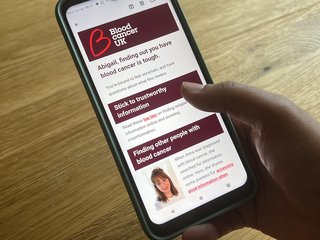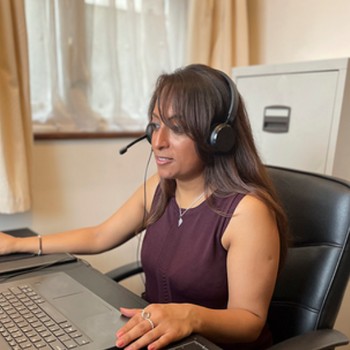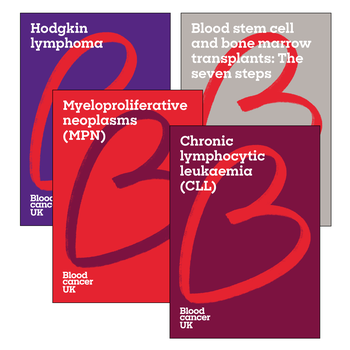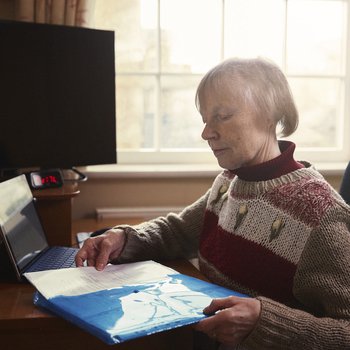Non-Hodgkin lymphoma
Non-Hodgkin lymphoma is a type of blood cancer that affects white blood cells called lymphocytes, which are an important part of your immune system.

Non-Hodgkin lymphoma at a glance
Non-Hodgkin lymphoma is a type of blood cancer that affects white blood cells called lymphocytes, which are an important part of your immune system.
There are different types of non-Hodgkin lymphoma depending on how the cells are affected and how the cancer behaves.
We have more detailed information if you know the specific type of non-Hodgkin lymphoma:
We also have information about a different type of lymphoma called Hodgkin lymphoma.
Sign up to our weekly support email for people recently diagnosed.
It gives you clear and simple information, practical tips and advice from others with blood cancer, to help during the first few weeks and months after diagnosis.
If someone you love has been diagnosed with non-Hodgkin lymphoma, you might find our information for family and friends helpful. It covers how to support someone with blood cancer, practical tips, coping with your own emotions, and real stories from other friends and family members.
You may also want to try our podcast for family and friends, Blood Cancer Heart to Heart, featuring honest conversations between people who know what it's like to have a loved one diagnosed with blood cancer.
A common symptom of non-Hodgkin lymphoma is lumps. These are swollen lymph nodes (glands). You may get painless swellings in your neck, collarbone, armpit, groin or other parts of your body.
Some swollen lymph nodes can press on organs and cause pain in your chest, coughing, breathlessness, or discomfort in your stomach area.
Other symptoms include:
- high temperature (fever)
- unexplained weight loss
- night sweats that soak your clothes and bedding.
We have more information about the symptoms of non-Hodgkin lymphoma. We also have information about symptoms of these specific types of non-Hodgkin lymphoma:
These are some of the common tests for non-Hodgkin lymphoma. We have more specific information about tests if you choose a type of non-Hodgkin lymphoma.
Blood tests
Your doctor will take samples of your blood to check your full blood count. This measures the number of each type of cell in your blood: red blood cells, white blood cells and platelets. They may also do other tests to see check how well your liver and kidneys are working.
Lymph node biopsy
In a lymph node biopsy, your doctor removes all or part of a lymph node during a short operation. Lymph nodes are glands that are found throughout your body. The sample will be sent to a laboratory to be looked at under a microscope.
Scans (or imaging)
You may have scans like MRI scans, CT scans, PET scans, ultrasound scans or x-rays. These are all done in different ways, but they all create detailed pictures of the inside of your body.
General health and infection screening
You may also have other tests to check your general health, and tests to check for conditions such as HIV or Hepatitis B and C.
Some side effects are short-term and go away after treatment has finished, but others can last longer. Tell your healthcare team about how you’re feeling, as there are normally ways they can help.
Tiredness (fatigue)
Fatigue is when you’re totally drained in body or mind. Things that help include balancing rest with activity, and learning what’s doable for you by keeping track of your symptoms.
Anaemia
Anaemia means having a low level of red blood cells. It can cause tiredness and breathlessness. You may be offered a blood transfusion to treat this.
Infections
Blood cancer and treatments like chemotherapy can weaken your immune system and make you more likely to get infections. It’s good to know the signs of an infection so you can get treatment like antibiotics quickly. There are things you can do to reduce your risk of getting infections. We have more information on signs of infection and reducing your risk.
Sore mouth (mucositis)
You might have a sore mouth or soreness in the lining of your gastrointestinal (GI) tract, which includes your food pipe, stomach and gut. This is a common side effect of chemotherapy and radiotherapy. It can be painful, but it is treatable with medicines and gets better with time. Read more about mucositis.
Changes to your bowel habits
You may have diarrhoea (frequent, loose or watery poo) or be constipated (find it hard to poo). There are medicines for this, and changes to your diet may help. Ask your healthcare team to refer you to a dietitian.
Feeling and being sick
Nausea and vomiting can be side effects of the treatment. Anti-sickness drugs (also called anti-emetics) can help. If you’re feeling sick, eat small, light meals or snacks. Peppermint tea, a fizzy drink or foods containing ginger can reduce nausea.
Problems with fertility
Chemotherapy treatment can affect whether you are able to have children (your fertility). It’s important to talk to your healthcare team about this if it worries you, as there are ways to preserve fertility.
While you’re having chemotherapy, it’s essential to avoid getting pregnant, because the drugs may harm the baby.
The treatments you have will depend on the type of non-Hodgkin lymphoma you have, how far it has spread (its stage) and whether you have symptoms.
We have more specific information about treatments if you choose a type of non-Hodgkin lymphoma.
These are some of the common treatments. You might have these treatments on their own or in combination.
Watch and wait
Some people with slow-developing non-Hodgkin lymphoma don’t need treatment straight away – this is called ‘watch and wait’. You’ll be carefully monitored, and will only start treatment if and when it’s needed. Watch and wait doesn’t mean that you can’t be treated. It’s offered when your doctor believes there’s no added benefit to starting treatment straight away.
Chemotherapy
Chemotherapy uses drugs to kill cancer cells or stop them from growing. You will normally have chemotherapy through drip into a vein (intravenously).
Radiotherapy
You may also have radiotherapy. Radiotherapy uses high-energy rays to kill cancer cells in a specific area. The radiotherapy would be aimed at affected lymph nodes or lumps.
Other drug therapies
There are other drug therapies that can be used on their own or with chemotherapy.
Targeted therapies are drugs that work by targeting proteins or genetic changes that cancer cells have, which normal cells don’t have. They are also sometimes called biological therapies or immunotherapy. An example used for non-Hodgkin lymphoma is rituximab.
Steroids
Steroids are drugs that can make some chemotherapy treatments more effective and help you feel less sick during treatment.
Some people will want to know how non-Hodgkin lymphoma will affect their future – this is known as your prognosis or outlook.
Your prognosis is individual to you and depends the type of non-Hodgkin lymphoma you have, what treatments you can have, and other things like your general fitness.
Ask your healthcare team about your prognosis if you want to know, because everyone is different. Your healthcare team know you and your individual situation.
Remember, your prognosis can also change over time, for example if you respond well to a treatment. Read our general information about things that might affect your prognosis.
You might find it difficult understanding or thinking about prognosis. Our Support Services Team is here to talk you through it, offer support, or simply listen.
Find out how other young adults have coped with a blood cancer diagnosis.
Clinical trials are how we find new treatments and improve current ones. We can help you find out about clinical trials for non-Hodgkin lymphoma. Even if you just want to know a bit more about non-Hodgkin lymphoma research, try our Clinical Trials Support Service.
Our research in lymphoma has focused on improving treatments. Read about our scientific impact on lymphoma.

Get a weekly support email from us
We'll send you clear and simple information, practical tips, and advice from other people with blood cancer, to help during the first few weeks and months after diagnosis.



